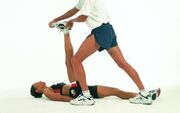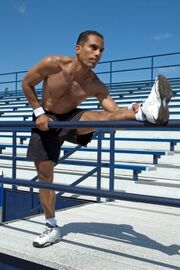No edit summary |
No edit summary |
||
| (10 intermediate revisions by 4 users not shown) | |||
| Line 1: | Line 1: | ||
| + | [[image:PNF.jpg|right|thumb|a partner offers the resistance needed for PNF stretching]] |
||
| − | Proprioceptive neuromuscular facilitation (PNF) |
+ | '''Proprioceptive neuromuscular facilitation''' (PNF), was originally created as a rehabilitation technique, but has been used for years as an alternative method of [[stretching]]. It is capable of facilitating greater gains in [[flexibility]] in a shorter amount of time than with other methods, such as [[static stretching]] or [[dynamic stretching]].<ref name=mac>{{cite web |
| + | |title=Flexibility - Mobility |
||
| + | |url=http://www.brianmac.co.uk/mobility.htm |
||
| + | |date=n.d. |
||
| + | |author=Mac, Brian |
||
| + | |publisher=Brianmac.co.uk |
||
| + | |accessdate=2008-10-03 |
||
| + | }}</ref><ref>{{cite web |
||
|title=Quick Guide to Stretching |
|title=Quick Guide to Stretching |
||
|url=http://fatalfitness.com/quick_guide_to_stretching |
|url=http://fatalfitness.com/quick_guide_to_stretching |
||
| Line 6: | Line 14: | ||
|publisher=FatalFitness.com |
|publisher=FatalFitness.com |
||
|accessdate=2008-04-11 |
|accessdate=2008-04-11 |
||
| − | }}</ref> PNF typically involves a partner who assists the stretcher by actively stretching the [[muscle]]. Each PNF stretch is done by alternating the |
+ | }}</ref> Proprioceptive neuromuscular facilitation involves the use of [[muscle contraction]] before the stretch in an attempt to achieve maximum muscle relaxation.<ref name=mac/> PNF also typically involves a partner who assists the stretcher by actively stretching the [[muscle]]. Each PNF stretch is done by alternating the contraction and relaxation of both [[agonist]] and [[antagonist]] muscles. It is usually done by a 10 second holding/contraction phase followed by a 10 second relaxation phase. ACSM suggests 6 second contractions followed by a 10 to 30 second assisted stretch. <ref>{{cite web |
| + | |title=Stretching and Flexibility |
||
| + | |url=http://www.exrx.net/ExInfo/Stretching.html |
||
| + | |date=n.d. |
||
| + | |author=unknown |
||
| + | |publisher=ExRx.net |
||
| + | |accessdate=2008-06-12 |
||
| + | }}</ref> |
||
| + | |||
| + | ==Performing PNF Techniques== |
||
| + | [[image:PNF-self.jpg|right|thumb|immovable objects can also be used for PNF stretching]] |
||
| + | The muscle group to be stretched is positioned so that the muscles are stretched and under tension. The athlete then contracts the stretched muscle group for 5 - 6 seconds while a partner, or immovable object, applies sufficient resistance to inhibit movement. The effort of contraction should be congruent to the individual's level of conditioning. The contracted muscle group is then relaxed and a controlled stretch is applied for about 30 seconds, taking the muscle slightly further than it was previously. The muscle group is then allowed 30 seconds to recover and the process is repeated 2 - 4 times.<ref>{{cite web |
||
| + | |title=Proprioceptive Neuromuscular Facilitation |
||
| + | |url=http://www.thestretchinghandbook.com/archives/pnf-stretching.php |
||
| + | |date=n.d. |
||
| + | |author=Stretching Handbook |
||
| + | |publisher=The Stretching Handbook |
||
| + | |accessdate=2008-10-08 |
||
| + | }}</ref> |
||
| + | |||
| + | ==See Also== |
||
| + | *[[Dynamic Stretching]] |
||
| + | *[[Myofascial Release]] |
||
==External Links== |
==External Links== |
||
| Line 14: | Line 44: | ||
{{reflist}} |
{{reflist}} |
||
[[Category:Flexibility]] |
[[Category:Flexibility]] |
||
| − | [[Category: |
+ | [[Category:Stretching]] |
Latest revision as of 16:50, 8 October 2008

a partner offers the resistance needed for PNF stretching
Proprioceptive neuromuscular facilitation (PNF), was originally created as a rehabilitation technique, but has been used for years as an alternative method of stretching. It is capable of facilitating greater gains in flexibility in a shorter amount of time than with other methods, such as static stretching or dynamic stretching.[1][2] Proprioceptive neuromuscular facilitation involves the use of muscle contraction before the stretch in an attempt to achieve maximum muscle relaxation.[1] PNF also typically involves a partner who assists the stretcher by actively stretching the muscle. Each PNF stretch is done by alternating the contraction and relaxation of both agonist and antagonist muscles. It is usually done by a 10 second holding/contraction phase followed by a 10 second relaxation phase. ACSM suggests 6 second contractions followed by a 10 to 30 second assisted stretch. [3]
Performing PNF Techniques

immovable objects can also be used for PNF stretching
The muscle group to be stretched is positioned so that the muscles are stretched and under tension. The athlete then contracts the stretched muscle group for 5 - 6 seconds while a partner, or immovable object, applies sufficient resistance to inhibit movement. The effort of contraction should be congruent to the individual's level of conditioning. The contracted muscle group is then relaxed and a controlled stretch is applied for about 30 seconds, taking the muscle slightly further than it was previously. The muscle group is then allowed 30 seconds to recover and the process is repeated 2 - 4 times.[4]
See Also
External Links
- ExRx.net-examples of PNF stretches
References
- ↑ 1.0 1.1 Mac, Brian (n.d.). Flexibility - Mobility. Brianmac.co.uk. Retrieved on 2008-10-03.
- ↑ Dan Donche (23 July, 2007). Quick Guide to Stretching. FatalFitness.com. Retrieved on 2008-04-11.
- ↑ unknown (n.d.). Stretching and Flexibility. ExRx.net. Retrieved on 2008-06-12.
- ↑ Stretching Handbook (n.d.). Proprioceptive Neuromuscular Facilitation. The Stretching Handbook. Retrieved on 2008-10-08.